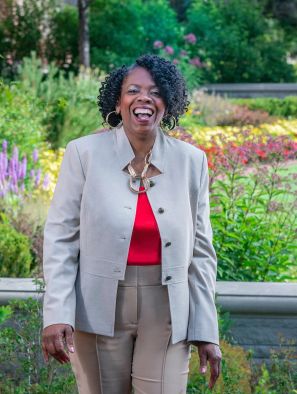Examining our work and our culture
As Black History Month nears an end, I wanted to highlight some exciting work that has begun within MarComm related to diversity, equity, and inclusion. Simply stated as “Increase Inclusion,” in MarComm’s Strategic Plan, the three main objectives under this goal are to 1) recruit more diversified staff and students, 2) diversify the University of Denver Magazine, and 3) build partnerships with the Office of Diversity, Equity and Inclusion (ODEI). The ultimate goal is to build a culture where everyone has a sense of belonging. Kari Burns, one of MarComm’s graphic designers, was named an ODEI Fellow late last year. She shared what motivated her to apply for the fellowship and the long-term impact this work can have for her, the division, and DU.
RM: Why are you doing this work? Leading a MarComm DEI committee?
KB: I have had the opportunity in my personal and professional life to examine, discuss, and learn about white privilege, systemic oppression, and antiracism. This work has become incredibly important to me and in my time here at DU, I have learned that we have so much work to do in order to make this a truly equitable and diverse space. When the ODEI Fellowship Program was announced last year, I knew I wanted to help facilitate conversations focused on systemic change within the Division of Marketing & Communications (MarComm). MarComm serves a critical role in supporting the University, and we have a responsibility to engage and make improvements around DEI within our team and within the work we are producing. The Fellowship and our DEI Committee gives us the time and resources to act on those important initiatives so we can better represent and support DU.
RM: What do you hope to accomplish in 30 days; six months; ultimately?
KB: In the first 30 days, we have already created an employee-led DEI committee that will be responsible for DEI trainings and tracking progress on specific goals for MarComm. Our team of 10 has identified several initiatives around equitable hiring practices, bias incident response strategies, equitable culture-building, and many more that will be addressed over the next six months. We have a lot of work to do in MarComm, but ultimately we are laying the groundwork that will allow our team to continue to address and examine our work, policies, and culture with a DEI lens.
RM: Tell me a little bit about your experience so far as an ODEI Fellow.
KB: I have been able to listen and participate in discussions with my fellowship cohort and larger community of campus leaders. I am so impressed with the quality of leadership I have witnessed in our ODEI team and the commitment to speak openly and honestly about the work we need to do at DU that so many people across campus are demonstrating every day. As our cohort begins to build committees and action plans in our respective areas, we are able to connect, share, and discuss our experiences. I feel a great sense of community within this space, and knowing that there is a collective movement working towards realizing change at DU makes me hopeful that we can make this a reality.
RM: How do you feel this work with the Office of Diversity, Equity and Inclusion and the MarComm DEI committee will impact you personally, the team, and the University?
KB: The focus and dedication to equity and anti-oppression work within DU has the potential to create tremendous change. As a predominantly white institution and division, we have a lot to learn and a lot to accomplish in the DEI space. As a white woman, this work impacts me every day and challenges me to reflect on my experience, to hold myself accountable, and to use my privilege to move these initiatives forward. As marketers and storytellers, this work will only improve the authenticity of our storytelling and our connection to the DU community. We are wrestling with the same challenges and issues that the rest of our country is grappling with today. I think DU has an opportunity to rise to the occasion and be an example of how to confront systemic racism by leading with humility and a willingness to change for the betterment of all members of their community through this work.








